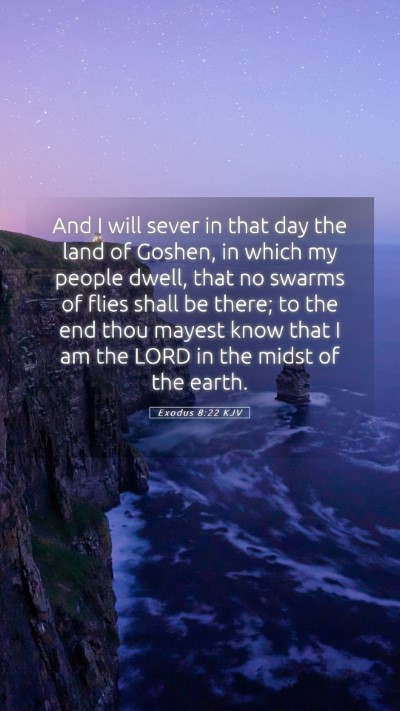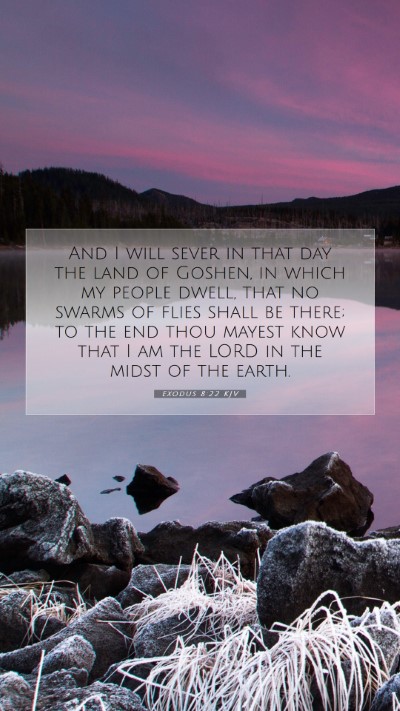Bible Verse Commentary: Exodus 8:22
Exodus 8:22 states: "And I will sever in that day the land of Goshen, in which my people dwell, that no swarms of flies shall be there; to the end thou mayest know that I am the LORD in the midst of the earth."
This verse represents a significant moment in the narrative of the Exodus, highlighting God’s sovereignty over creation and His ability to protect His people amid judgment.
Meaning and Context
The context of Exodus 8:22 is crucial in understanding its meaning. At this point in the narrative, God has begun delivering plagues upon Egypt as a declaration of judgment against Pharaoh and the Egyptian gods. The specific plague referenced involves a swarm of flies, symbolizing chaos and divine retribution.
Divine Protection
God promises to distinguish His people, the Israelites, living in the land of Goshen, contrasting their fate with that of the Egyptians. This act serves multiple purposes:
- Demonstration of God's Power: The separation demonstrates God's authority over natural elements, stressing that He can preserve and protect His chosen people.
- Affirmation of Faith: This assurance serves to bolster the faith of the Israelites, reminding them of God’s covenant and care.
Insights from Commentaries
Commentators such as Matthew Henry emphasize that this separation reflects God's providence. He notes that God's interventions are not arbitrary but are aimed at revealing His identity as the One True God.
Albert Barnes elaborates on the significance of “the land of Goshen,” a place of refuge and blessing, symbolizing comfort and divine favor amidst the surrounding adversities faced by Egypt. He remarks that the distinction highlights not only God’s will but also His governance over locational spaces.
Adam Clarke provides an insightful historical context, explaining how flies were associated with pestilence and decay, thus increasing the severity of the plague for the Egyptians while leaving the Israelites unharmed. He suggests that this direct intervention serves to illustrate God's mercy towards His people.
Theological Implications
Exodus 8:22 reflects profound theological insights:
- Covenant Relationship: This verse reinforces the concept of covenant, indicating that God has a unique relationship with His people.
- Judgment and Mercy: It highlights the duality of God's nature—He is both just in His judgment against sin and merciful towards His people.
Applications for Today
Modern readers can draw significant life lessons from Exodus 8:22:
- Trust in Divine Protection: Just as the Israelites were shielded from the plagues, believers today can find solace in God's promise of protection amidst worldly troubles.
- Recognition of God’s Presence: Acknowledging that God is present within our life circumstances, providing guidance and support.
Related Bible Cross References
This verse can be cross-referenced with:
- Exodus 9:26 - God's protection over Goshen during the hail plague.
- Psalm 91:1-2 - The promise of refuge under God's wings.
- Isaiah 43:2 - Assurance of God's presence in times of trouble.
Conclusion
In summary, Exodus 8:22 serves not only as a historical account of God’s protective measures for the Israelites but also as a profound illustration of God's character and His relationship with His people. Understanding this verse equips believers with deeper insights into scripture analysis, biblical exegesis, and practical applications for daily living, thereby enriching biblical study groups and online Bible study engagements.


